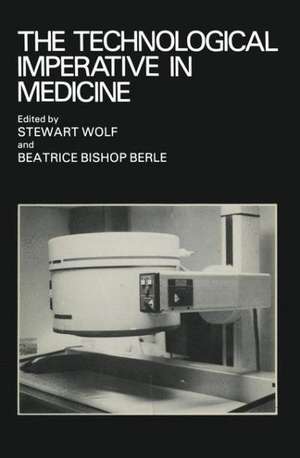The Technological Imperative in Medicine: Proceedings of a Totts Gap colloquium held June 15–17, 1980 at Totts Gap Medical Research Laboratories, Bangor, Pennsylvania
Editat de Stewart Wolfen Limba Engleză Paperback – 29 feb 2012
Preț: 380.07 lei
Nou
Puncte Express: 570
Preț estimativ în valută:
72.74€ • 75.66$ • 60.05£
72.74€ • 75.66$ • 60.05£
Carte tipărită la comandă
Livrare economică 14-28 aprilie
Preluare comenzi: 021 569.72.76
Specificații
ISBN-13: 9781468441208
ISBN-10: 1468441205
Pagini: 164
Ilustrații: X, 150 p.
Dimensiuni: 152 x 229 x 9 mm
Greutate: 0.23 kg
Ediția:Softcover reprint of the original 1st ed. 1981
Editura: Springer Us
Colecția Springer
Locul publicării:New York, NY, United States
ISBN-10: 1468441205
Pagini: 164
Ilustrații: X, 150 p.
Dimensiuni: 152 x 229 x 9 mm
Greutate: 0.23 kg
Ediția:Softcover reprint of the original 1st ed. 1981
Editura: Springer Us
Colecția Springer
Locul publicării:New York, NY, United States
Public țintă
ResearchDescriere
This volume contains the edited proceedings of a Totts Gap Colloquium held June 15 to 17, 1980 at Totts Gap Medical Research Laboratories in Bangor, Pennsylvania under the sponsorship of three neighboring community hospitals in the Lehigh Valley; St. Luke's Hospital of Bethlehem, Easton Hospital of Easton and Muhlenberg Medical Center of Bethlehem. The objective of the meeting was to examine from several points of view the impact of rapidly proliferating technology on medical education, practice and research, on hospitals and on the community at large. The participants were selected not only for their diversity of experience and point of view, but also for ability to listen as well as to speak. They were asked to examine, in an informal analytical dialogue, the effects on the quality and cost of health care and health education brought about by increasing reliance on medical technology. A further aim was to explore various strategies through which might be devised an affordable way to benefit fully from technological advances without compromising human initiative or diminishing emphasis on clinical judgment and effective communication between doctor and patient. The participants included a medical student, seasoned practitioners and medical educators, young specialists, researchers, administrators and members of boards of trustees of community hospitals and laymen as follows: Dr. Robert Ackerman, Associate Professor of Radiology, Harvard Medical School and Director of the Carotid Evaluation and Cerebral Blood Flow Laboratories at Massachusetts General Hospital. Dr. Paul B.
Cuprins
1 Learning the Rational Use of Technology in Medicine.- 2 Impact of Technology on Medical Practice.- 3 Impact of Technology on Medical Education.- 4 Impact of Technology on Community Hospitals and Their Patients.- 5 Adaptation to Medical Technology—Shaping the Future.- 6 Meeting the Challenge — Summary & Formulation.- References.- Background Literature.









